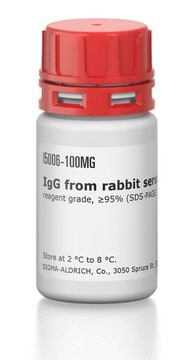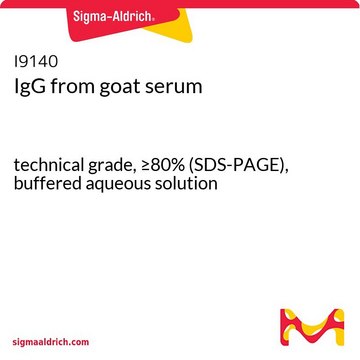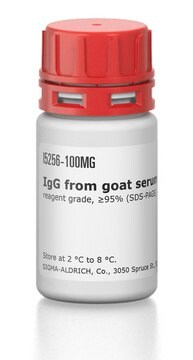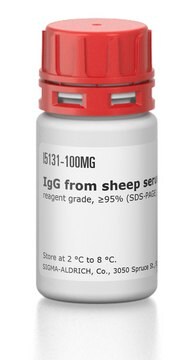I8140
IgG from rabbit serum
technical grade, ≥80% (SDS-PAGE), buffered aqueous solution
Synonym(s):
Rabbit IgG
Sign Into View Organizational & Contract Pricing
All Photos(1)
About This Item
Recommended Products
conjugate
unconjugated
Quality Level
grade
technical grade
Assay
≥80% (SDS-PAGE)
form
buffered aqueous solution
shipped in
dry ice
storage temp.
−20°C
Looking for similar products? Visit Product Comparison Guide
Application
IgG from rabbit serum has been used:
- as a reference, standard or blocking agent in many immunoassays including dot blots, ELISA, Westerns, IEP, and immunodiffusion assays
- in arthus reaction
- in chromatin immunoprecipitation
Biochem/physiol Actions
Immunoglobulin G (IgG) regulates the immune responses such as phagocytosis and is also involved in the development of autoimmune diseases. IgG1 regulates complement fixation in mice.
Physical form
Solution in 0.01 M phosphate buffered saline, pH 7.2, containing 15 mM sodium azide
Preparation Note
Rabbit IgG is purified via fractionation from pooled normal rabbit serum
Analysis Note
Immunoelectrophoresis (IEP) is used to establish the identity of the Rabbit IgG. . A single major arc of precipitation in the gamma region is observed versus anti-rabbit whole serum and anti-rabbit IgG. Minor gamma arcs may be present versus anti-rabbit whole serum
Disclaimer
Unless otherwise stated in our catalog or other company documentation accompanying the product(s), our products are intended for research use only and are not to be used for any other purpose, which includes but is not limited to, unauthorized commercial uses, in vitro diagnostic uses, ex vivo or in vivo therapeutic uses or any type of consumption or application to humans or animals.
Storage Class Code
12 - Non Combustible Liquids
WGK
WGK 2
Flash Point(F)
Not applicable
Flash Point(C)
Not applicable
Choose from one of the most recent versions:
Already Own This Product?
Find documentation for the products that you have recently purchased in the Document Library.
Customers Also Viewed
Valérie Bardet et al.
Haematologica, 91(6), 757-764 (2006-06-14)
Abnormal activation of several signal transduction pathways such as phosphoinositide 3-kinase (PI3K) and MAP kinases has been reported in acute myeloid leukemia (AML). To test new targeted therapeutics, it is critical to develop sensitive analytical tools to detect abnormal activation
Frances Rena Bahjat et al.
Arthritis and rheumatism, 58(5), 1433-1444 (2008-04-29)
To assess whether R788, an orally bioavailable small molecule inhibitor of spleen tyrosine kinase (Syk)-dependent signaling, could modulate disease in lupus-prone (NZB x NZW)F1 (NZB/NZW) mice via inhibition of Fc receptor (FcR) and B cell receptor signaling. R788 was administered
Janus Schou Jakobsen et al.
Genome research, 23(4), 592-603 (2013-02-14)
Dynamic shifts in transcription factor binding are central to the regulation of biological processes by allowing rapid changes in gene transcription. However, very few genome-wide studies have examined how transcription factor occupancy is coordinated temporally in vivo in higher animals.
Elena Matveeva et al.
Cell discovery, 2, 15046-15046 (2016-07-28)
Specialized chromatin structures such as nucleosomes with specific histone modifications decorate exons in eukaryotic genomes, suggesting a functional connection between chromatin organization and the regulation of pre-mRNA splicing. Through profiling the functional location of Poly (ADP) ribose polymerase, we observed
Lily Chien Wang et al.
DNA repair, 7(12), 1973-1981 (2008-09-13)
Fanconi anemia (FA) is a recessive genetic disorder characterized by hypersensitivity to crosslinking agents that has been attributed to defects in DNA repair and/or replication. FANCD2 and the FA core complex bind to chromatin during DNA replication; however, the role
Our team of scientists has experience in all areas of research including Life Science, Material Science, Chemical Synthesis, Chromatography, Analytical and many others.
Contact Technical Service














